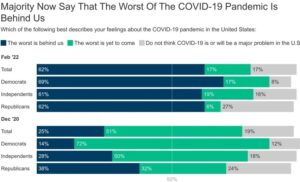 You really can’t answer “yes,” because Covid-19 hasn’t gone away, and isn’t likely to. But most experts, “with some reservations,” think “in the US and much of Europe, the most destructive waves of Covid-19 are” behind us. (See article here.) In other words, it won’t sicken and kill as many of us.
You really can’t answer “yes,” because Covid-19 hasn’t gone away, and isn’t likely to. But most experts, “with some reservations,” think “in the US and much of Europe, the most destructive waves of Covid-19 are” behind us. (See article here.) In other words, it won’t sicken and kill as many of us.
They cite “widespread immunity,” new treatments “like monoclonal antibodies and antiviral drugs,” and a “better understanding of ventilation, social distancing, and other mitigation strategies” that put us in “a better position to reduce transmission” as reasons for optimism.
But it’s still a threat, almost certainly will remain so, and they worry about new variants — including ones that might evade current vaccines — and low vaccination rates in some countries. And, of course, understanding the virus better doesn’t translate to getting it under control if subgroups of society ignore science, medical advice, and common sense.
Most likely the best thing we have going for us is that historical experience to date says “all pandemics eventually end.” That’s no comfort to the 958,621 Americans who’ve died from Covid-19 as of March 6, 2022, or are struggling with Covid-19’s long-term effects, including permanent organ damage in some cases. And we have stupid politicians ordering school kids to take off masks — which should be up to their parents and them, based on the advice of health experts, because even if the pandemic ends Covid-19 is never going away.
So “better understanding” isn’t enough. To harness our society’s ability to protect us in the future, we have to elect the right people to preside over our public health institutions and policies. Anti-vaxxers, anti-maskers, and conspiracy theory peddlers aren’t the right people for that job. That should be obvious to all.
This graph (click to enlarge) shows Americans are becoming more complacent about Covid-19
